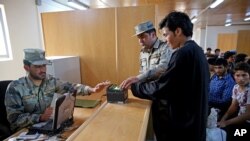A recent exchange of prisoners between Iran and Afghanistan may signal Tehran’s willingness to repair strained relations between the two countries over the regime’s internal treatment of Afghans, analysts say.
Kabul has lodged several protests in recent months over Iran’s conduct toward Afghans inside Iran, including its caging of several Afghan prisoners in a city square and sending thousands of Afghans to fight on the front lines of the Syrian war.
Around 200 chained Afghan prisoners arrived Thursday on Iranian buses at the Islam Qala checkpoint in western Herat province. The transfer occurred after Kabul handed over approximately two dozen Iranian nationals who had been serving jail terms in Afghanistan.
"Tehran expedited this exchange ... to divert attention from the previous events and news of its systematic mistreatment of Afghan citizens,” said Mostafa Hazareh, a Kabul-based Afghan journalist who follows Iranian affairs.
The two countries agreed to a prisoner exchange in 2012, but only two have occurred since then. Sixteen Afghan prisoners were transferred in 2014.
Roughly 3 million Afghans live in Iran, with most settling there after fleeing war and conflict in their homeland. But many lack basic rights and live without citizenship or residency status. About 950,000 Afghans in Iran are classified as refugees.
Iran has sent thousands of Afghan refugees, mainly ethnic Shi'ite Hazaras, to Syria to fight alongside forces of Hezbollah and Iran's elite Revolutionary Guard forces in support of the Syrian regime. Dozens of Afghans have died in the Syrian war.
Iran's treatment of Afghans has stirred up diplomatic tension between the two capitals.
Hundreds of Afghans last week protested in front of the Iranian consulate in Herat city to condemn the caging of Afghan detainees in Iran’s Shiraz city.
Economic and infrastructure initiatives
Analysts see the prisoner exchange as an attempt by Iran to repair ties as several economic initiatives and the implementation of power and water management projects kick off in Afghanistan.
A new rail corridor, under construction between Iran and Afghanistan, will greatly expand the flow of materials from Asia to Iran through Afghanistan. The port will provide an alternative for trade between Afghanistan and India.
"Iran is looking forward to the transit of goods from its southeastern Chabahar seaport to Afghanistan and Central Asian states," said Wadir Safi, a Kabul University professor of law and political science.
The port will provide Tehran with a strategic advantage and links with central Asian states through Afghanistan.
"Iran is looking for regional and international connectivity after years of sanctions," analyst Safi said, referring to international trade bans imposed over Iran’s controversial nuclear program.
Water issues
Iranian authorities also have been hunting for a larger share of water supplies from Afghanistan. It has voiced concerns that Herat province's new Indian-funded hydroelectric and irrigation Salma Dam, recently renamed as the Afghan-India Friendship Dam, may reduce the flow of water into Iran.
"Iran’s efforts to revive the Hamoun wetlands on the Iran-Afghanistan border are intensifying," economic analyst Fatemeh Aman told VOA.
The Afghan government has downplayed Iranian concerns and said the dam will not affect the amount of water flowing into Iran.
"And if Iran wants more water, it should revert to international laws governing water resources," law professor Safi said, adding that Iran could consider buying additional water from Afghanistan, beyond the amount agreed in the 1973 water-sharing treaty between the two countries.
Iran sees increasing trade with Afghanistan as vital to reviving its economy.
“Strengthening our regional cooperation with Afghanistan is a priority and a major pathway to consolidate peace and economic in the region," Gholamali Khoshroo, Iran’s ambassador to the United Nations, said last week.
Complaints over conditions
But even as trade between the countries increases, whether the prisoner exchange results in softened treatment for Afghans inside Iran remains in doubt, analysts say.
"Afghan prisoners receive mistreatment in Iranian prisons. They live in poor conditions,” said Shamsoddin Rahnama, An afghan activist in Khorasan province which borders Afghanistan.
Human rights groups estimate that roughly 5,000 Afghans are imprisoned in Iran. Activists accuse the Iranian judiciary of bias; many Afghans say they have not received due process.
Human rights groups have also expressed concerns over how Afghan refugees are treated in Iran.
"The estimated 2.5 to 3 million Afghan refugees and migrant workers in Iran face barriers to receiving social services. They are at higher risk than the general population of being arbitrarily questioned and sometimes detained by authorities, with little recourse to the law when abused by government officials or private parties," Human Rights Watch said earlier this year.
Rafiuallah Baidar, a spokesman for the Afghanistan Independent Human Rights Commission, told VOA the commission "expects that Iranian authorities would treat Afghan refugees with dignity and in accordance with the international Refugee laws. Their human rights must not be violated."
The Iranian regime says it is improving life for Afghans inside Iran.
"We continue our support to hundred thousands of Afghan refugees, especially in fields of education and medical services," said Khoshroo, the Iranian envoy to the United Nations.
Afghan analysts say the Iranian regime will continue to use Afghans inside the country as a political bargaining asset with Kabul.
Although Iran publicly denounces militant insurgency in Afghanistan, Tehran has reportedly been in communication with the Taliban battling the Afghan government. The group’s supreme leader, Mullah Akhtar Mansoor, died in a U.S. drone strike after holding meetings in Iran.




